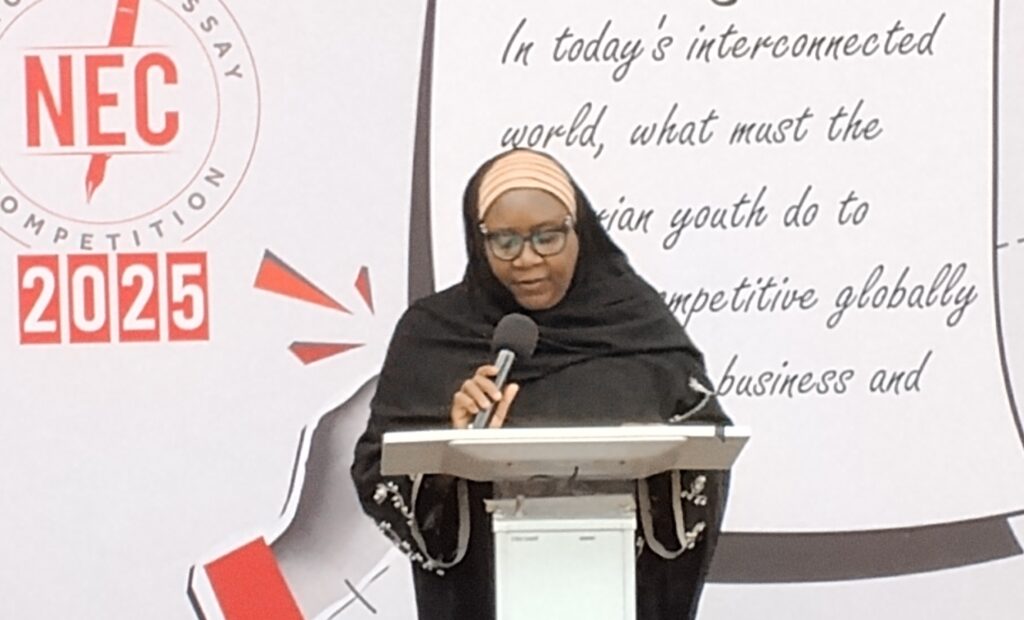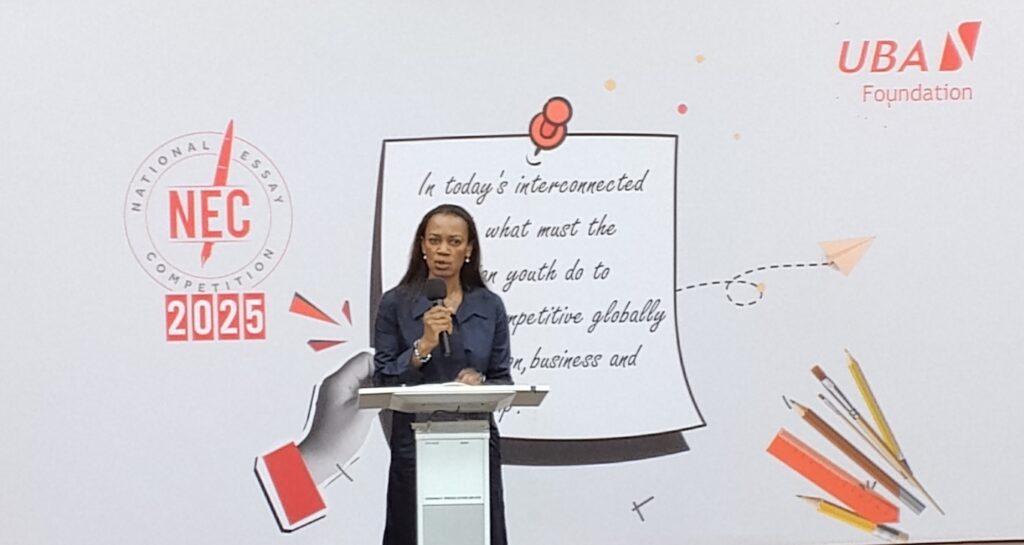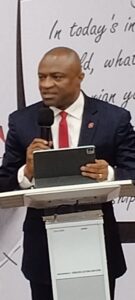Thirteen-year-old Ebunoluwa Oluwatimilehin, an SS2 student of Igando Community Senior High School, Lagos, on Tuesday, emerged the overall winner of the 15th edition of the UBA Foundation National Essay Competition.
Oluwatimilehin made history as the first male winner after the competition had produced female winners for eight years in a row.
His victory earned him a grand prize of a N10 million educational grant to support his future studies at any university of his choice in Africa, alongside other prizes.
The first runner-up, Njoku-Kelechi, an SS2 student of Emerald of Christian International High School, Owerri, received a N7.5 million educational grant and other gifts, while the second runner-up, Fatima Bayero of Cornerstone Montessori Schools, Gudu, Abuja, was awarded a N5 million educational grant and other prizes.
According to the Managing Director and Chief Executive Officer of the Foundation, Bola Atta, the educational grants were increased from their previous amounts of N7.5 million, N5 million and N3.5 million for the top three winners, respectively, in response to inflation and the current economic realities.
The other finalists also received laptops and other educational materials to support their academic pursuits.
Oluwatimilehin expressed joy over his achievement and thanked the UBA Foundation for providing a platform for young people to express themselves.

Speaking about his win, he said the competition was challenging, noting that he stayed up late reading and researching to craft the winning essay. “It is a testament to the fact that hard work and commitment are certainly rewarding,” he added.
He noted that participating in the competition has helped him gain insight into contemporary issues in Nigeria.
Essay’s focus
According to the organisers, over 7,000 entries were submitted for the 15th edition of the competition, but judges have raised concerns over the growing use of short-format expressions and AI-generated content among participants.
This year’s competition challenged students to write an essay on the topic: “Nigeria is characterised by diverse cultures, ethnicity, and religions. How can young Nigerians deploy diversity to build a united nation?”
After a rigorous screening process by professors of English from universities across the country, 12 finalists were selected and invited for a physical essay writing session on “In today’s interconnected world, what must the Nigerian youth do to remain competitive globally in education, business and leadership?”
The panel of judges included Samuel Onuigbo of the University of Nigeria, Nsukka; Ini Uko of the University of Uyo, Akwa-Ibom State; Asabe Usman of Uthman Dan-Fodio University, Sokoto; and Emmanuel Omobowale of the University of Ibadan, all professors.
Presenting the panel’s report, Ms Usman expressed concern about the infiltration of SMS-style and social media short-format expressions in many submissions, which negatively affected marks.

She highlighted the prevalence of AI-generated essays, noting that many contained similar expressions and lacked originality.
“The quality of electronic submissions was poor,” she said, pointing out that some documents were unreadable, while others were submitted in video format. She further pointed out that some students wrote out of context, and in certain schools, a single person wrote the essay for all participants.
ALSO READ: AMDF unveils 2025 award finalists, set to host development journalism conference
The professor also noted that SS2 students dominated participation this year, with 11 of the 12 finalists coming from SS2, and only one from SS3. Despite these challenges, she acknowledged that a significant number of students demonstrated a commendable grasp of Nigeria’s socio-cultural landscape.
“The quality of the essays this year was generally fair, perhaps because the students are now conscious of the expected standard of this competition,” Ms Usman noted.
Parameters for assessment
Ms Usman described the essay topic as not only relevant to contemporary national realities but also addresses a central national concern, which is Nigeria’s multicultural makeup and the need for unity.
According to her, the entries were evaluated using the following parameters: content (40 marks), expression (30 marks), organisation (15 marks), and mechanical accuracy (15 marks), totalling 100 marks.
“Content here refers to the relevance of ideas to the topic, its specific audience, and purpose. It also covers the appropriateness of the language and relevance to the central theme. Accuracy in the treatment of the subject matter is important, and there must be clarity in the approach,” she said.
“By expression, we mean the choice of vocabulary and format of composition. Vocabulary must be controlled, sentences well structured, judicious and imaginative use of figurative language are also allowed and descriptive words to aid vivid illustrations. By organisation, we mean the correct use of format features such as good paragraphing, appropriate use of emphasis, and relevance of ideas.
Paragraphs should be chronologically and logically compelling, including a suitable opening, adequate development, coherent links between paragraphs, balance, unity, and a suitable conclusion. Mechanical accuracy covers adherence to grammar, punctuation, and spelling rules,” she explained.
The Group Managing Director/Chief Executive Officer of UBA Plc, Oliver Alawuba, commended the panel for the rigour of their work and stressed the need for policymakers to take the feedback seriously and use it to influence policy change.
He encouraged Nigerian students to “keep writing, keep believing, and keep building the Africa of our dream.” He added that the bank is already working towards making the essay competition a Pan-African initiative.
‘Casual expressions, AI misuse threaten students’ literacy’
Short format expressions are shortened versions of words or phrases used in short message service (SMS) and social media to save time, space, and typing effort. They are mostly used in informal communication.
Examples of such expressions are: LOL – Laugh out loud, BRB – Be right back, BTW – By the way, FYI – For your information, IDK – I don’t know, IMO – In my opinion, DM – Direct Message, AMA – Ask me anything, etc.
In an interview with one of the judges, Ms Uko, a professor of English at the University of Uyo, expressed concern over the persistent use of casual and informal expressions in the formal writings of Nigerian students at all levels.
She said, “It is unfortunate that society has become so depraved by so many factors. Parents are too busy chasing after money and other things to supervise what their children are occupied with. Many children grow with the misnomer that social media is a credible platform to learn from. Perversion in society causes what is wrong to be accepted and defended as right.”
According to the professor, the declining reading culture leaves young people unable to develop vocabulary, adding, “In fact, they actually lose whatever they may have got earlier. Consequently, they resort to any available easy means. This predicament accounts also for the high degree of corruption in examinations because students who do not study, but want to pass, and many of them aspire to excellent grades undeservedly.”
Ms Uko also criticised the quality of teaching in Nigeria, pointing out a vicious cycle in education. “Many candidates who are found unqualified for admission to their courses of choice in many Nigerian universities get shoved into education programmes. They end up being the teachers of our children. So, that is a vicious cycle that creates hopelessness. How can the youth perform well when they are taught by poor performers?”
She lamented the lack of structures for progressive teacher retraining, particularly in public schools, adding that education sector managers “are not bothered by this tragedy that has become a major scourge in our culture.”
On the role of technology, Ms Uko highlighted the impact of Artificial Intelligence (AI) on literacy. “Contemporary Nigerian youths have resorted to AI as a replacement for their critical thinking skills, not minding a major principle of the use of AI being the modification of the generated text.
She lamented that students often obtain AI-generated texts and use them in their raw forms. “That was evident in the submissions for the just concluded National Essay Competition sponsored by the UBA Foundation in Lagos. Such essays were obviously marked down because they lacked originality.”
She stressed the need for proper guidance and teacher training: “Generally, students should be taught the principles of deploying AI. Also, I suspect that the teachers themselves may not know much about those, and that reinforces the need for progressive update trainings of teachers.
“Definitely, AI is not meant to rob students of their reading and writing capacities. It is rather a useful resource for study, research, teaching, etc., and our youths should be guided to use it credibly and responsibly, not for fraudulent purposes as what dominantly obtains currently.”
She, therefore, called for awareness in formal writing, encouraging young people to be able to distinguish what is acceptable in formal writings so that outputs are not marred by environmental language usage factors.
Organisers note growth, impact of competition

Earlier in her opening remarks, Mrs Atta congratulated the winners and other finalists for their exceptional performance out of more than 7,000 entries.
She disclosed that the competition recorded a 75 per cent increase in entries this year. “A lot of entries this year came from outside Lagos State, which shows that the initiative is growing and spreading far and wide,” she said.
Mrs Atta noted that the competition has significantly improved students’ writing skills, confidence, critical thinking, and awareness of social issues in their environment. She encouraged them to continue developing their critical thinking skills.
Also, the Group MD/CEO of UBA, Mr Alawuba, commended the Foundation’s 15-year commitment to the initiative, which, according to him, has been boosting reading culture and healthy competition among secondary school students in Nigeria and other African countries.

He said, “We believe strongly in quality education, and we believe that the future of the world lies in Africa and that future can only be achieved by preparing young people well.”
He added that the competition has produced many winners who are now contributing meaningfully to national development, and he assured that the bank, through the initiative, will continue to invest in the education of African youths.

